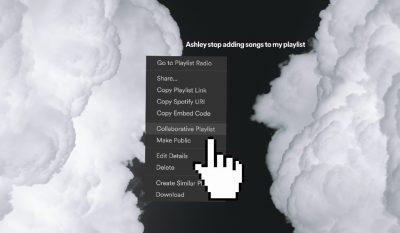The only thing worse than bad art made by human beings is bad art made by robots because the terrible quality cannot be attributed to lived experience. Those robots are terrible artists because of an algorithm, not because no one in their life ever told them they were bad at something.
If you’ve ever made a collaborative playlist on Spotify, you may have come across the bot by the name of Ashley. Bot Ashley pretended to be human users and took over collaborative playlists by adding an unmanageable number of songs by terrible electronic artists.
Spotify has since restricted its collaborative playlist feature with a “invite only” setting, effectively killing Bot Ashley’s main form of existence. But Bot Ashley’s legacy lives on in the many playlists entitled “Ashley stop adding songs to my playlist” and her iconic self-aware album entitled “Stop adding,” with tracks like “Songs to my playlist.” That’s right, this bot makes music of her own, which sounds as if the stale air in a dentist office grew consciousness.
I know, theoretically, that the internet has solved the problem of space. There is now unlimited room for any amount of music to exist, even the banal musings of a sentient advertisement. But I can’t help but be continually frustrated by the fact Bot Ashley exists.
At my most cynical, I feel life is a crowded room of people and things screaming at you to pay attention to them. Why inundate the room further with music that doesn’t mean anything? This is music not designed to reflect any one human experience or feeling, but rather, to simply affirm Bot Ashley’s existence as useless virtual clutter.
Maybe the more important question to ask is, why write an article about a long dead Spotify bot? Why further add to this clutter?

The reason Bot Ashley bothers me still — even though Spotify has already effectively murdered her — is because she reminds me of myself. Who is to say that any of the writing I produce does not take up space in the same obtrusive way she does? How can we really know whether the work we do is worth other people’s time? What are we all if not fleshed out approximations of stale air in a dentist’s office?
In the end, I have resolved this anxiety in myself in this way:
One of the playlists Bot Ashley ruined of mine was a collection of all the versions I could find of “Águas de Março,” or “The Waters of March.” It’s a Brazilian song from the 70s, and it’s about life. To a bossa nova rhythm, Antônio Carlos Jobim and Elis Regina list a series of ordinary things with no seeming relation.
That’s the whole song: “a stick, a stone, the end of the road” — that kind of thing. But by the end, I feel teeming with life. There’s restrained joy in Jobim and Regina’s voices, joy that threatens to burst through the ordinariness of the song, but never quite gets there. By the end all that ordinariness coalesces, and it leaves me feeling quite complete.
At the time, I painstakingly removed Bot Ashley’s numerous additions of Finnish EDM. But thinking back on the lyrics of “Águas de Março,” I now realize I may have been mistaken. One uncited anecdote on Wikipedia claims that Jobim wrote the song as a form of therapy, an unconstrained stream of consciousness.
This makes sense with the rhythm of the song, as Jobim included plenty of boring things in its steady rhythm — “a lump,” “the ground,” “a truckload of bricks.” All of these things take up the same amount of space in the song as more worthy things. Even if they are seemingly empty, they contribute all the same.
So in effect, Bot Ashley did not ruin the vibes of my playlist by drowning it in terrible Finnish EDM. In fact, her additions reflected the core philosophy of “Águas de Março” — that everything, no matter how boring, matters. And that I and Finnish EDM artists should continue to make our art, because our contributions — no matter how terrible — are part of what makes life whole.














